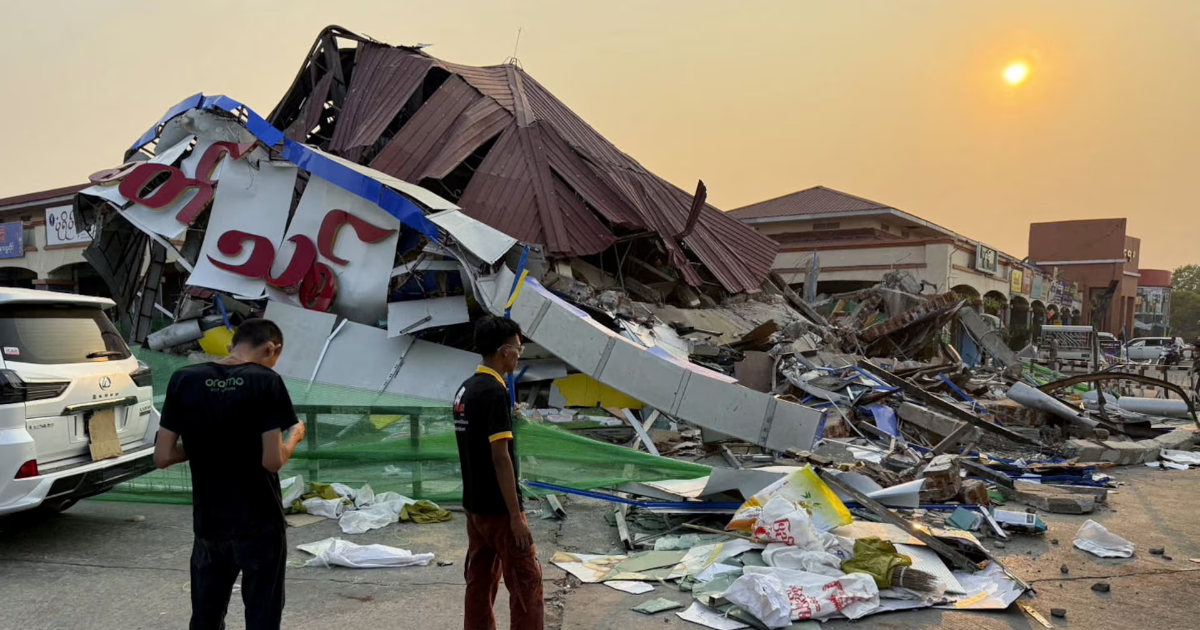April 1 (Reuters) – On Thursday night, Myanmar junta leader Min Aung Hlaing stood astride a jeep, touring columns of saluting soldiers as fighter jets shot flares and helicopters buzzed overhead in an annual display of military might in the capital, Naypyitaw.
The general was riding high, set to join a regional leaders’ summit in Thailand this week, a rare overseas trip four years after seizing power in a coup that ushered in a ruinous civil war and made him an international pariah.
Sign up here.
But within 24 hours, a 7.7 magnitude earthquake had reduced parts of Naypyitaw to ruins, dealing a major blow to the home of Myanmar military power in the purpose-built, isolated capital whose Burmese name means “Abode of Kings”.
Without electricity, water or internet, junta officials are working from the lawns beside the ruins of the foreign ministry while residents sleep on the street for fear of aftershocks.
The quake – Myanmar’s strongest in a century – has killed around 2,000 people and dealt widespread devastation including in Naypyitaw, a city unveiled in 2005 after being secretly built by previously ruling generals who wanted an impregnable fortress.
The city was built to evoke the grandeur of ancient Buddhist architecture and former royalty, with wide manicured boulevards including a little-used 20-lane highway and monumental government buildings with colonnades.
It had stood mostly protected from the chaos of civil war that has rocked other parts of the country since the coup: a rare drone attack last year was foiled.
Satellite images and photos published by local media show collapsed hospitals and government housing compounds, while at least one ministry has been severely damaged.
“Water is scarce, food scarcer,” said a source in Naypyitaw who, like others, requested anonymity. “Electrical power is absent. Fuel, medicine, shelter – luxuries now.”
The damage extended to the giant presidential palace, where photos published by local media show the wreckage of a gold-lined spiral staircase and chandelier.
A junta spokesman did not respond to requests for comment.
MINISTRY DAMAGED
The foreign ministry, shaped with other ministries like a scorpion’s claws believed by some to augur good fortune, has suffered “severe damage” and fatalities, according to a U.N. official who spoke on condition of anonymity.
The ministry is without power or water and everyone from the minister down is sitting and working at the entrance, the official said.
State-run media showed a picture of the foreign minister, Than Swe, participating in an emergency meeting with regional counterparts on Sunday by video, sitting outside a visibly damaged building, curtains dangling from the frames of smashed-in windows.
The ministry “tells us they are no longer in business, no comms or building,” said a source with knowledge of the matter, adding that staff in Yangon, the former capital and biggest city, had been delegated responsibilities.
Initial reports suggest damage to military infrastructure in Naypyitaw has been limited, said Morgan Michaels, Research Fellow for Southeast Asian Security and Defence at the International Institute for Strategic Studies.
The airport control tower has crumbled, but aircraft hangars appear intact, he said.
“Across the earthquake zone, roads are damaged, and this could impact logistics and deployments in the short term,” Michaels said.
“But so far it doesn’t look like the earthquake will have dealt a serious blow to the military’s fighting capacity, from a hardware and infrastructure standpoint.”
The military continued to bomb towns even in the aftermath of the disaster, an armed opposition group said on Sunday.
Nonetheless, in Buddhist-majority Myanmar – where many ascribe deep astrological significance to natural disasters and successive military leaders have looked to prophecies to guide decisions – some may divine a symbolic blow.
“Even for a rather superstitious country, Min Aung Hlaing is known to be particularly superstitious,” said Richard Horsey, senior Myanmar adviser at International Crisis Group.
“Even if he doesn’t believe the earthquake is some form of karmic retribution, he knows that others in his inner circle and the military elite – and the country at large – may well draw that conclusion.”
FULL MORGUES
The severe impact on Naypyitaw is likely part of the reason the junta quickly appealed for international aid, said Horsey.
“Min Aung Hlaing also knows that this is a moment of considerable risk for his regime – his own patronage networks and the military elite are affected,” said Horsey.
Some commentators have said Naypyitaw appears to be receiving more assistance than the densely populated city of Mandalay and region of Sagaing where entire neighbourhoods were flattened and residents say there has been no visible signs of military mobilisation.
But in the capital, too, residents described scenes of unabated suffering.
It was mostly children and the elderly who died when several multi-storey buildings housing government staff collapsed during the quake, one resident told Reuters.
They heard people among the debris but no help arrived to retrieve those trapped until the following evening. “Rescue didn’t arrive in time to so many places,” she said.
The next day, police came to retrieve the dead bodies. Meanwhile, the morgue is full, and has no electricity to keep bodies cold, so many rot on the street outside.
“We didn’t receive any food, water, or medical help yet,” the resident said. “We are still living on the street outside our building.”
(This story has been refiled to add the name and title in paragraph 22)
Reporting by Poppy McPherson in Bangkok and Shoon Naing. Additional reporting by Devjyot Ghoshal. Writing by Poppy McPherson. Editing by Lincoln Feast.
Our Standards: The Thomson Reuters Trust Principles.
